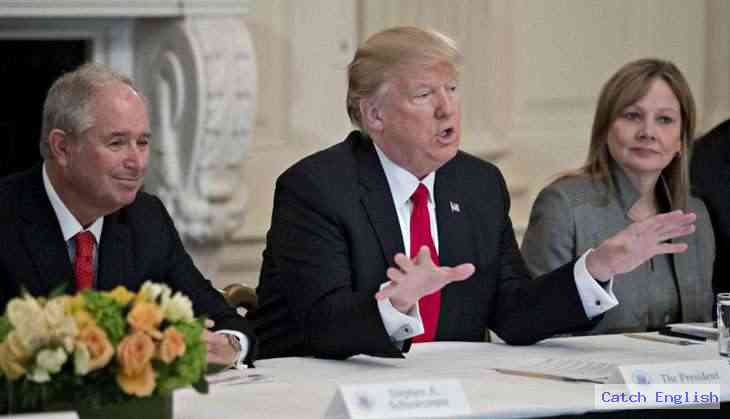How storytelling explains world politics, from Spain to the US

How is Donald Trump like the leader of Spain's Podemos movement, a long-haired, left-wing university professor named Pablo Iglesias?
It's tempting to say he's not.
It's quite another thing to compare Trump and former Italian prime minister Silvio Berlusconi. Aside from language and birthplace, Trump is basically the American Berlusconi, both political outsiders and businessmen who rose to the heights of power.
The paradox is that although Trump and Iglesias are ideological opposites - and, of course, Trump says and does things that Iglesias would never even think - both leaders have employed the same narrative tactic to get where they are: political storytelling.
Narrative as a political tool
The key lies in their communication strategy and the intended recipients of their messages: the despairing masses on both sides of the Atlantic, from the "working-class whites" in the US to Spain's "indignados" (the indignant).
Here's how it works: the more desperate and fed-up people are with hearing the same unfulfilled promises, and the more they think about how their kids will probably end up worse off than they are now, the more predisposed they are to listen, believe and vote for candidates who propose doing something different within the confines of the political system.
They feel moved. Something - a story, a tale - with more emotion than reason makes their hearts beat faster. Because, whether we like it or not, emotions lie in the same area of our brain where we process political information.
That's what political storytelling is all about. Both the progressive Spaniard and the atypical Republican have used the tactic to great effect, each in his own way. So have Latin American presidents of the past decade, many of them masters of narrative.
Venezuela's Hugo Chávez is a powerful case, taking his narrative - based on Simon Bolivar's Latin American liberation movement - to the extreme of renaming his country the Bolivarian Republic of Venezuela. The Kirchners in Argentina and Evo Morales in Bolivia also mastered the art.
They have all shown the power of narratives in seducing disillusioned voters. Here are the nine key features of a powerful narrative.
Nine characteristics of political narrative
-
They are tales of power, wherein the "good guys" are victims of the "bad guys". Trump's recent inauguration speech showed numerous antagonistic relationships, pitting "Washington" against the people; evil politicians, who did nothing while "the jobs left and the factories closed", versus poor citizens.
-
They blame inept or unscrupulous politicians for letting insidious interests win - for example, Iglesias has railed against the monsters of "financial totalitarianism" that have humiliated Spaniards - and position themselves as the heroes who will recapture past righteousness (with an epic battle of good and evil).
-
They use a direct, simple and emotionally charged messages: "I will build a wall and Mexico will pay for it!"
-
They offer solutions, which must seem feasible, even if they aren't. They have to show that another future is possible. Former Brazilian president Lula's "zero hunger" campaign is a good example.
-
They seek to recover a mystical past, connecting people to their roots and lost values. Where and when? That doesn't matter, as long as the narrative revives people's dreams: "Make America Great Again"
-
They construct, or reconstruct, an identity whose sole reference point is often a leader who defines themselves as something different and new. Adding an "ism" to the end of a name supports this idea: "El Chavismo", "Kirchnerism", "Maoism". The narrators of the greatest political stories are charismatic leaders who can easily devolve into authoritarianism. This isn't always the case, and South Africa's Nelson Mandela and Spain's Felipe González are notable exceptions.
-
They revive founding myths by citing, for example, America's Founding Fathers (such as Abraham Lincoln) or their society's revolutionary origins (as in Cuba and China).
-
They impose an us-versus-them dialectic. The "enemies" may be Muslims or immigrants (for Trump)), or the insatiable European Union (for Iglesias). With time, this tends to rip apart the social fabric; consider the case of the Kirchners in Argentina who left a divided nation behind them.
-
They use simple analogies and linear explanations. Pablo Iglesias often says "blessed people, damned caste" to differentiate the citizenry from the political elites who've clung to power in Spain for the past 40 years.
The end of the story
Beyond demonstrating an ignorance of world history, underestimating the power of a candidate who mobilises the base using this kind of emotional messaging can be electoral suicide.
In many countries, traditional political parties have already learned this lesson, entering into serious democratic crises that are undermining the foundations of their political system. Venezuela is a critical case.
Still, in the political narrative script, Trump and Podemos are the heroes: finally, someone has arrived who "truly" represents those who've been excluded and abandoned by politics as usual. Both leaders would say that these marginalised folks - the protagonists of their tale - are the best society has to offer.
Such narratives are nothing new. They can be traced back to the Greeks, with their mythology, and the Romans, with their commemorative constructions, like the emperors columns in every Roman Forum.
Political tales don't last forever; like empires, they go through phases of development, consolidation and decline. Unless they can reinvent themselves, counter-narratives will appear and the story starts over again.
The French, American, Soviet, Cuban, Chinese, Chavista Bolivarion revolutions - these are all stories laden with epic characteristics and heroic symbolism, without which it's possible that their historic value would have expired long ago. Instead, they are still leveraged to overcome political and social crises.
One final curiousity: many of these stories involve building walls, from Troy to the Berlin wall to, yes, the Beautiful Mexican Wall.
In the end they all failed, of course, some more ignominiously than others. History can be merciless to leaders who offer desperate people simple solutions to complex matters.
Orlando D'Adamo, Director, Center for Public Opinion, Universidad de Belgrano
This article was originally published on The Conversation. Read the original article.
First published: 14 February 2017, 6:51 IST





![BJP's Kapil Mishra recreates Shankar Mahadevan’s ‘Breathless’ song to highlight Delhi pollution [WATCH] BJP's Kapil Mishra recreates Shankar Mahadevan’s ‘Breathless’ song to highlight Delhi pollution [WATCH]](http://images.catchnews.com/upload/2022/11/03/kapil-mishra_240884_300x172.png)

![Anupam Kher shares pictures of his toned body on 67th birthday [MUST SEE] Anupam Kher shares pictures of his toned body on 67th birthday [MUST SEE]](http://images.catchnews.com/upload/2022/03/07/Anupam_kher_231145_300x172.jpg)






